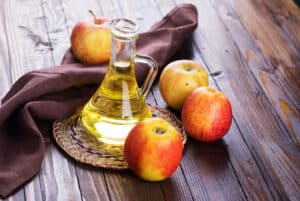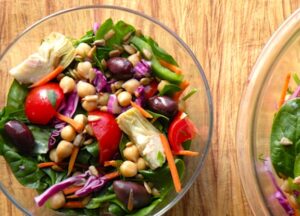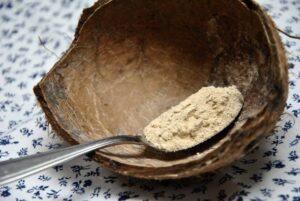Maintaining a vegan diet during pregnancy always seem to cause concern, but it can be done! Here are some tips and valuable information.
During pregnancy, your need for all nutrients increases. For example, you will need more calcium, more protein, and more folic acid. But calorie needs increase only modestly during pregnancy. In fact, you will need to pack all of that extra nutrition into just 300 extra calories a day. For that reason, all pregnant women need to choose their meals wisely. It is important to eat foods that are rich in nutrients, but not high in fat or sugar, or excessive in calories.
See also: Our article on Super Foods for Pregnancy and Lactation.
Helpful books recommended by VegKitchen:
- The Vegetarian Mother's Cookbook* by Cathe Olson (review)
- Everything Vegan Pregnancy Book* by Reed Mangels, RD, PhD (review)
Vegetarian and vegan diets, based on nutritious whole foods are healthful choices for pregnant women. Use the chart below to plan your meals.
Whole Grains, Breads, Cereals
6 or more servings
Serving = 1 slice of bread, ½ bun or bagel, ½ cup cooked cereal, rice, pasta; 1 ounce ready-to-eat cereal.
Dark Green Leafy Vegetables
1 to 2 servings
Serving = ½ cup cooked or 1 cup raw kale, collards, mustard or turnip greens, spinach, or broccoli.
Other Vegetables and Fruits
4 to 5 servings
Serving = ½ cup cooked, 1 cup raw, 1 piece of fruit, ¾ cup fruit juice, ¼ cup dried fruit.
Bean and Soy Products
3 to 4 servings
Serving = ½ cup cooked beans, 4 ounces tofu or tempeh; 8 ounces soymilk.
Nuts, Seeds, Wheat Germ
1 to 2 servings
Serving = 2 tablespoons nuts or seeds, 2 tablespoons peanut butter, 2 tablespoons wheat germ.
Be sure to include a reliable source of vitamin B 12, such as any common multivitamin or fortified soymilk or cereal.
Guidelines for Good Health during Pregnancy
- Begin a healthful diet before you become pregnant. The early growth and development of your baby is supported by your body stores of nutrients.
- Maintain a steady rate of weight gain. Aim for about three to four pounds total during the first trimester and then about three to four pounds each month during the second and third trimesters.
- See your health care provider regularly.
- Limit empty calories found in highly processed foods and sweets. Make your calories count!
Nutrients
To make certain that you are getting adequate nutrition, pay particular attention to these nutrients.
All of the groups above include foods that are rich in calcium. Be certain to include at least four servings of calcium-rich foods in your diet every day. These include tofu, dark green leafy vegetables, bok choy, broccoli, beans, figs, sunflower seeds, tahini, almond butter, calcium fortified soymilk, and calcium-fortified cereals and juices.
Vitamin D: This nutrient is poorly supplied in all diets unless people use foods that are fortified with it. Many brands of ready-to-eat cereals are fortified with vitamin D. However, the body can make its own vitamin D when skin is exposed to the sun. Pregnant women who don’t use fortified foods should be certain to get at least 20 to 30 minutes of direct sunlight on their hands and faces two to three times weekly.
Vitamin B12: Vitamin B12 is not found in most plant foods. To get enough of this important nutrient, be certain to consume one serving every day of a food that is fortified with vitamin B12. These foods include many breakfast cereals, some meat substitute products, and some brands of soymilk. Certain brands of nutritional yeast, like Red Star, are good sources of vitamin B12. Be certain to read the label to find out which foods are fortified. Seaweed and products like tempeh are generally not good sources of vitamin B12. Vitamin B12 is also in all standard multivitamins and in vegetarian supplements.
Iron is abundant in plant-based diets. Beans, dark green vegetables, dried fruits, blackstrap molasses, nuts, seeds, and whole grain or fortified breads and cereals all contain plenty of iron. However, women in the second half of pregnancy have very high iron needs and may need to take a supplement regardless of the type of diet they follow. Your health care provider will discuss iron supplements with you.
A word about protein
The need for protein increases by about 30 percent during pregnancy. However, since most people consume abundant amounts of protein anyway, the average woman consumes more protein than is needed by a pregnant woman. Whole grains, vegetables, legumes, nuts, and seeds are all protein-rich foods. The meal-planning chart above provides plenty of protein for pregnancy.
Breastfeeding
The guidelines for breastfeeding mothers are similar to those for pregnant women. Milk production requires more calories so you will need to boost your food intake a little bit.
Menu Ideas
- Plan meals around nutritious whole grains, beans, fruits, and vegetables. Add sesame seeds, wheat germ, or nutritional yeast for flavor and nutrition.
- Cooked leafy green vegetables are a powerhouse of nutrition. Add them to soups and casseroles.
- Snack on dried fruits and nuts to boost your intake of iron and other important trace nutrients.
This article was prepared by Constance Dunbar, MPH, RD. Reprinted by permission of Physician’s Committee for Responsible Medicine.
- Looking for a great book on vegan pregnancy? Read VegKitchen's review of The Everything Vegan Pregnancy Book* by Reed Mangels, RD, PhD.
- For more tips on plant-based nutrition, make sure to browse VegKitchen’s Nutrition page.
- For lots more features on healthy lifestyle, please explore VegKitchen’s Healthy Vegan Kitchen page.
*This post contains affiliate links. If the product is purchased by linking through this review, VegKitchen receives a modest commission, which helps maintain our site and helps it to continue growing!






Catherine says
My son was born an even 8lbs I ate a vegan diet throughout my entire pregnancy. I also juiced organic fruits and vegetables at least three times a week. Garden of Life Vitamin Code Raw Prenatal vitamins & a gelatin and fish free DHA are a must take while pregnant and nursing. I am still nursing he's 9months old now healthy as can be! Just up your nuts, beans, legumes and seeds intake for extra protein and iron, increase your fruit & veggie intake for more nutrients. Drink lots of water at least 8oz an hour and reduce/ eliminate stress and you will have the best baby ever!
Catherine says
I forgot to mention you should also take garden of life raw iron, vitamin d, vitamin e daily. If you can take b-12 shots weekly, if not garden of life has several types of raw vitamin b & b-12.
Jessica Lawrence says
iam 34 years old.2nd pregnancy going on on now 5th month started.How i can get a good healthy child? Because my first child’s weight was only 2 kg at birth. i had taken good foods and milk fruits and vegetables. But no use.